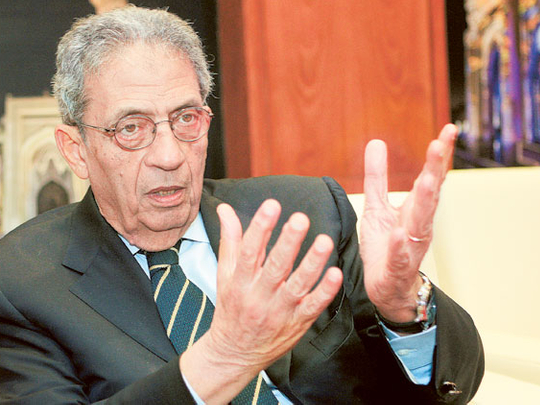
Sharjah: A decision on whether to participate in April’s parliamentary elections proposed by Egyptian president Mohammad Mursi will be taken in a meeting scheduled for Tuesday by opposition figures, a leading opposition member said on Sunday.
Amr Mousa, former Secretary-General of the Arab league, head of the Egyptian Congress Party and one of the members of Egypt’s National Salvation Front, however, refused to disclose his “personal preference”, and said he will be part of the collective decision on the elections.
“We have to put the pros and cons,” he said of the discussion on Tuesday.
“I will participate actively in explaining and listening to the argument,” he told Gulf News in an interview during a government communications forum held in Sharjah.
“I hope we will have a consensus on the elections. I prefer to keep my decision [for myself] because I need to go and discuss it tomorrow evening with my party and then on Tuesday with the [opposition front]. But I don’t mind even it is to boycott elections if it is unanimous. If it is not unanimous, then participation in the election would be an option.”
When asked whether it is a matter of unanimity or not, Mousa explained: “In fact, it is not a question of unanimity as a question of consensus.”
Mousa also noted that there are different opinions, including boycotting the electoral process, opposing its timing and reluctance coupled with favouritism to participation.
And for Mousa himself, “the personal preference when it comes to elections is always is to run for elections and to join in the electoral process, but Egypt is going through special circumstances, most of them negative. The priorities are confused, and there are questions about the timing of the elections, what is the best for Egypt.”
Already, Mohammad Al Baradei, another leading opposition figure has called for a boycott of the elections.
“This is his point of view… He has the right to express whatever he wants,” Mousa said.
While some analysts believe the opposition’s boycott of a constitution referendum in the future and the upcoming parliamentary elections would work against them and their demands, Mousa stressed that the opposition has not refused the president’s initiatives, including holding a national dialogue.
“We have disagreed in terms of the dialogue. We disagreed on the way the dialogue was proposed, and about the guarantees… It is not refusal, but we were against the terms and after all there are certain things that do not necessarily need a dialogue, the president can decide at a certain point what is good for the people in services, in laws, and so on.”
“We don’t challenge the fact that the president was elected democratically and he is the president of Egypt. But we defer with his policies and we have a lot to say about his policies, and this is our right as citizens and the normal course of action when it comes to democracy,” Mousa said.
At the same time, Mousa noted that the government has not accepted the opposition initiatives of forming a national unity government that includes all parties working and governing together to serve the people and change the situation to a better one.
The Egyptian leadership’s lack of planning, vision and a viable and vital role to change the situation, including the deteriorating economic situation, are among the reasons behind the opposition to its management.











